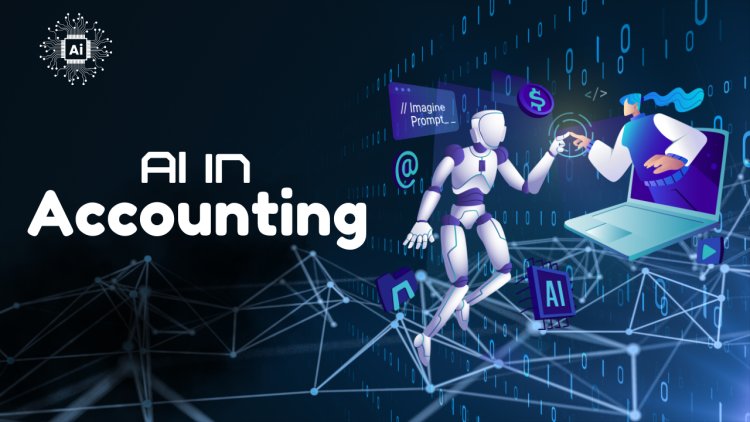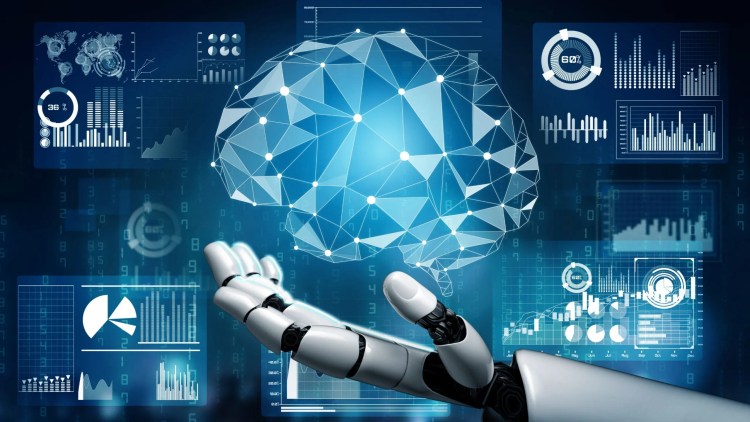The Impact of AI on Accounting:
Artificial Intelligence(AI) changes the accounting face by becoming more precise, efficient, and a decision-making tool. It makes tasks such as data entry, invoice processing, and bank reconciliations redundant in terms of saving time and error reduction. AI quickly scans large financial data quantities to help the accountant realize trends, fraud detection, and better prediction. It helps answer real-time queries related to accounting through the use of chatbots and virtual assistants to enhance the support of the clients. However, this trend also means that there would be displacements of jobs and requires professionals to develop new competencies. To adapt, accountants will have to focus on strategic tasks, interpretation of insights from AI, and the provision of value-added services in financial planning. While AI simplifies many things, human judgment is important for most decisions. It is simply that AI is reshaping rather than replacing accountants as a profession.

The accounting industry has gone through a lot of changes in recent years due to new technology. One of the biggest changes is the use of AI is transforming how accounting tasks are done, making them faster and more efficient. It can handle routine work automatically and helps businesses make better decisions using data.
This article explores how Artificial Intelligence is influencing Accounting, proves its influential impacts, and why learning Income Tax, GST, Tally, and Accounting Courses are so vital in life at the moment.
Understand the Role of AI in Accounting
The new transformative technology, AI in accounting, is applied via machine learning, natural language processing, and RPA to automate and enhance the performance of finances. Compared to usual methods, AI systems can analyze large datasets with accuracy and predict outcomes to provide insights for better-informed decisions.
Key Areas Where AI is Transforming Accounting
- Automation of Repetitive Tasks
These include tasks such as data entry, processing of invoices, and reconciliation which take a lot of time and are error-prone. AI automates these, which in turn reduces the number of errors and allows the accountant to focus on other strategic roles. For example:
- Invoice Processing: AI extracts data from invoices, validates entries, and updates financial records.
- Reconciliation: AI algorithms automate matching transactions across multiple accounts.
Learning automation in tools like the Tally Prime course will help professionals bring maximum efficiency to those tasks.
2. Financial Analysis: Better AI can analyze gigantic data sets in real time, understand patterns, and predict trends, thereby increasing the accuracy of the depth of financial reporting.
- AI can also prepare customized financial reports according to business requirements.
- Predictive analytics helps the business in forecasting revenue, expenses, and cash flow, thus helping businesses make appropriate financial planning.
3. Compliance and Taxation
AI makes compliance with tax laws and regulations easy as tax calculations and filing are done through AI. This also minimizes the risk of facing penalties due to non-compliance.
- AI tools always stay up-to-date with tax laws and automatically update the system.
- Advanced systems like GST filing software use AI to handle intricate calculations and generate error-free returns.
Professionals can gain expertise in navigating this evolving landscape through a taxation course staying updated with AI-integrated tax solutions.
4. Fraud Detection and Risk Management
AI is very effective in its fraud detection capabilities and risk assessment. By analyzing transactional data and finding anomalies, AI prevents financial fraud against businesses.
- Transactions are monitored, which is an ongoing process towards adhering to the rules and regulations of a business.
- AI algorithms can rate the risk according to past records and trends, helping in making strategic decisions on potential threats.
Benefits of AI in Accounting
1. Increase accuracy and efficiency
AI minimizes human mistakes in financial transactions, leading to proper record-keeping and proper reporting. It also quickens processes, completing processes in minutes that would take several hours otherwise.
2. Cost Management
The automated repetitive activities of AI reduce manpower requirements as well, meaning massive cost-cutting for corporations.
3. Data-Driven Decision Making
AI enables accountants and business leaders to make action-oriented strategic decisions based on the insights attained from real-time data analysis.
4. Scalability
AI systems scale with business growth and are adept at handling growing volumes of data; hence they become invaluable assets for sustained long-term growth.
Requirements Upskilling in the Era of AI
This change by AI in the accountancy profession calls for continuous development by professionals to keep their knowledge current. Traditional skills cannot do well anymore; instead, AI-driven systems require mastery of AI-driven tools.
1. Value of Specialized Course
Upskilling is critical as people pursue courses that meet modern needs:
- Accounting Course: It lays out the foundational and advanced principles of accounting including how they work with AI.
- Taxation Course: Majorly focuses on tax laws and AI-driven compliance solutions.
- GST Course: Outlines GST filing knowledge to the professionals and AI-integrated tools.
- Tally Course: Practical training with Tally Prime, accounting software with AI features.
2. Maintaining a Lead in the Job Market
Employers are starting to value candidates with skills in AI-powered accounting tools. These courses' certifications present evidence of proficiency, and as such, the candidates are becoming more competitive in the labor market.

Challenges of Integrating AI in Accounting
AI has numerous advantages; however, its integration in accounting is not without a problem:
1. High Implementation Costs
The adoption of AI technology entails huge investments in infrastructure, training, and software. For small businesses, these costs may be high to manage.
2. Data Privacy Issues
AI-based systems maintain their operations with an enormous amount of data. There arise concerns about the security of that data and resultant privacy issues. Ensuring data protection compliance is essential.
3. Skill Gaps
Most accounting professionals lack the technical skills required to use AI tools effectively. This gap should be addressed through training programs.
4. Job Displacement
The automation of tasks threatens the accounting sector with job loss. However, this is an opportunity to upskill and transition to roles that require strategic decision-making and AI oversight.
Real-World Applications of AI in Accounting
1. Clara by KPMG
KPMG, a leader in professional services around the globe, presented Clara as an AI-facilitated platform, thus improving the quality of auditing and adding transparency to the process.
2. QuickBooks with AI
QuickBooks uses AI for processing invoices classifying expenditures and preparing financial projections; hence it is preferred among small businesses.
3. Tally Prime
Tally Prime, widely taught in Tally courses, incorporates AI features like real-time data syncing and anomaly detection, revolutionizing business accounting.
Preparing for the Future of Accounting
AI’s influence on accounting is only set to grow. Professionals and businesses must embrace this change proactively by:
1. Training Investment: Join accounting courses, taxation, GST, and Tally courses to create a competitive advantage.
2. AI Tool Adoption: Businesses should invest in AI-powered accounting systems to streamline the process.
3. Collaboration: Accountants need to collaborate with IT professionals for the effective use of AI.
Conclusion
There is no doubt that AI is affecting accounting. Through the automation of routine tasks, improved accuracy, and enabling strategic decision-making, AI is changing the profession into an increasingly analytical and data-driven one. However, it requires a change in skillsets.
What's Your Reaction?














